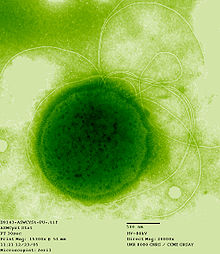Thermococci
This article has multiple issues. Please help improve it or discuss these issues on the talk page. (Learn how and when to remove these messages)
|
| Thermococci | |
|---|---|

| |
| Thermococcus gammatolerans | |
| Scientific classification | |
| Domain: | |
| Kingdom: | |
| Phylum: | |
| Class: | Thermococci Zillig and Reysenbach 2002
|
| Order | |
| Synonyms | |
| |


In taxonomy, the Thermococci are a class of microbes within the Euryarchaeota.[1]
They live in extremely hot environments, such as hydrothermal vents, and they have optimal growth temperatures above 80 °C. Thermococcus and Pyrococcus (literally "balls of fire") are both obligately anaerobic chemoorganotrophs.
Thermococcus prefers 70–95 °C and Pyrococcus 70-100 °C. Palaeococcus helgesonii, recently discovered in the Tyrrhenian Sea, is an aerobic chemoheterotrophic that grows at temperatures of 45–85 °C with an optimal temperature of 80 °C. Thermococcus gammatolerans sp. nov. was recently discovered in the Guaymas Basin, and it grows at temperatures from 55–95 °C with an optimal temperature around 88 °C with an optimal pH of 6. It has pronounced radioresistance and can survive gamma radiation at 30 kGy.[2]
Thermococcus grows on organic substrates where there is a higher capacity of elemental sulfur. This archaeon mostly grows between temperatures 60–100 degrees Celsius. The average temperature where they thrive is around 85 degrees Celcius.
The DNA structure has a cicular genome with around 2,353 coding sequence, and 2,306 are identified.
See also
[edit]References
[edit]- ^ See the NCBI webpage on Thermococci. Data extracted from the "NCBI taxonomy resources". National Center for Biotechnology Information. Retrieved 2007-03-19.
- ^ "Airspade". Retrieved 13 June 2023.
Further reading
[edit]- Cavalier-Smith, T (2002). "The neomuran origin of archaebacteria, the negibacterial root of the universal tree and bacterial megaclassification". Int. J. Syst. Evol. Microbiol. 52 (Pt 1): 7–76. doi:10.1099/00207713-52-1-7. PMID 11837318.
- Marguet, Evelyne; Gaudin, Marie; Gauliard, Emilie; Fourquaux, Isabelle; le Blond du Plouy, Stephane; Matsui, Ikuo; Forterre, Patrick (2013). "Membrane vesicles, nanopods and/or nanotubes produced by hyperthermophilic archaea of the genus Thermococcus". Biochemical Society Transactions. 41 (1): 436–442. doi:10.1042/BST20120293. PMID 23356325.
- Woese, CR; Kandler O; Wheelis ML (1990). "Towards a natural system of organisms: proposal for the domains Archaea, Bacteria, and Eucarya". Proc. Natl. Acad. Sci. USA. 87 (12): 4576–4579. Bibcode:1990PNAS...87.4576W. doi:10.1073/pnas.87.12.4576. PMC 54159. PMID 2112744.
- Zillig W; Reysenbach AL (2001). "Class IV (sic) [V]. Thermococci class. nov.". In DR Boone; RW Castenholz (eds.). Bergey's Manual of Systematic Bacteriology Volume 1: The Archaea and the deeply branching and phototrophic Bacteria (2nd ed.). New York: Springer Verlag. pp. 169. ISBN 978-0-387-98771-2.
- Garrity GM; Holt JG (2001). "Phylum AII. Euryarchaeota phy. nov.". In DR Boone; RW Castenholz (eds.). Bergey's Manual of Systematic Bacteriology Volume 1: The Archaea and the deeply branching and phototrophic Bacteria (2nd ed.). New York: Springer Verlag. pp. 169. ISBN 978-0-387-98771-2.
